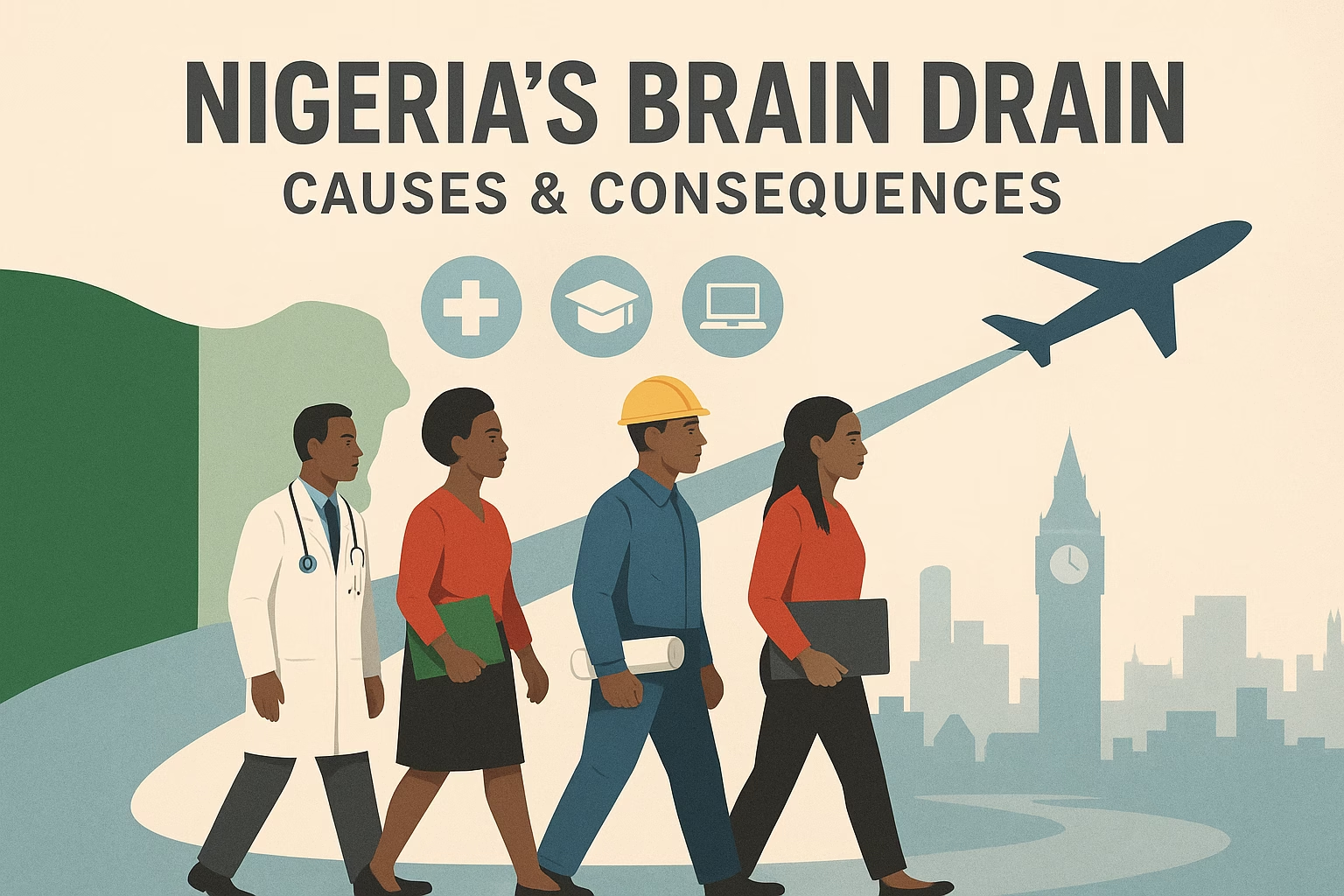
What began about 30 years ago as a trickle of Nigerians looking for greener pastures in foreign lands has metamorphosed into an increasing wave of brain drain that is becoming an existential threat to the Nigerian economy and social foundations.
Brain Drain is the large-scale emigration of skilled professionals such as doctors, nurses, academics, engineers, and IT experts. It happens when highly skilled or educated people leave their home countries to live and work elsewhere, usually for better opportunities. While migration is a fact of life and can create opportunities for individuals, the long-term impact on national development is profound, and this is becoming all too real and is reflecting quite obviously, especially in the educational and health sectors in Nigeria.
Brain Drain is, however, not a phenomenon specific to Nigeria, as we see millions of Indian and Pakistani IT experts, doctors, and engineers moving to the UK, USA, and Gulf Countries, while we see thousands of nurses and caregivers from the Philippines migrating to Europe, the US, the Middle East, and even Africa.
Nigerians, who have coined the term “JAPA” for people leaving the country for greener pastures and better opportunities abroad, tend to migrate to the UK, the USA, Europe, and the Gulf Countries.
Causes of Brain Drain in Nigeria
Several factors drive Nigerians to seek opportunities abroad:
- Economic instability: Despite high educational qualifications, there are very limited job opportunities for graduates. The wages are low and inconsistent, and inflation pushes professionals to countries with better pay and living standards.
- Poor working conditions: Many doctors, academics, and IT experts cite inadequate facilities, outdated equipment, poor infrastructure, and underfunded institutions.
- Insecurity: Rising levels of violence, kidnapping, and terrorism affect the sense of safety and future stability.
- Educational aspirations: Students often travel abroad for advanced studies and choose not to return, seeking stronger research environments. The consistent strikes by lecturers and non-academic staff causing an extended number of years in school, way past what is standard academic terms for their courses.
- Global demand: Developed nations actively recruit skilled labour to fill shortages in healthcare, technology, and education.
- Bad Governance: The obvious lack of commitment from successive governments to extend more capital financial resources to key sectors such as health, education, infrastructure development, etc
Consequences of Brain Drain
The ripple effects of brain drain are far-reaching; however, there are positive and negative consequences.
Negative Consequences
- Healthcare crisis: With thousands of highly skilled Nigerian doctors practicing abroad, hospitals at home face staff shortages, longer wait times, and weaker health outcomes. Most thriving and excellent doctors in the UK and the US are of Nigerian origin and, sadly, still educated in Nigeria.
- Academic decline: Universities lose top researchers and lecturers, weakening Nigeria’s ability to compete globally in knowledge and innovation. This leads to weaker research outputs, less innovation capability, and poor global rankings of our universities.
- Economic loss: Billions invested in education and training leave the country when professionals relocate permanently. This reflects in the loss of human capital and financial investments spent on them.
- Stunted Development: Critical economic sectors like engineering, IT, medicine, and academia struggle with talent gaps. This slows national development, industrial growth, and technological advancement.
- Generational gap: Young Nigerians see migration as the only viable option, creating a cycle of talent flight, where new generations aspire to leave and not build at home.
Positive Consequences
- Diaspora remittances: While brain drain has downsides, remittances from the Nigerians in diaspora contribute significantly to the economy, with an average of about $20 billion recorded annually in the last 5 years.
- International recognition: Nigerian academic and medical skills are being showcased around the world. Successful Nigerians abroad showcase our excellence on the world stage.
- Investments in the economy: Nigerians abroad, aside from the diaspora remittances, often invest in businesses, real estate, and start-ups, while some return in later years with capital and international experience that fuel innovation.
- Global Networks & Influence: Nigerian professionals abroad build strong networks in medicine, academia, business, and politics. These networks help open doors for trade, investment, and cultural exchange.
The Way Forward
Addressing brain drain requires bold action by the government in the areas of investment in infrastructure, improved wages, working conditions, stronger governance structure, and policies that attract talent back home. Nigeria must not only produce talent but also create an environment where that talent can thrive.






